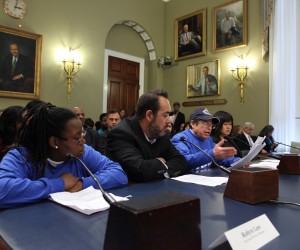
Yesterday, as fast food workers took action all across the country, low-wage federal contract workers – organizing under the banner of Good Jobs Nation testified at a special hearing convened by the Congressional Progressive Caucus.
“I’ve been a fast food worker at the Pentagon for 8 years, but I only make $8.75 an hour,” Robyn Law told Members of Congress. “I have to tell my son that ‘mommy can’t afford to buy you new shoes’ because I don’t make enough to pay our rent. It breaks my heart.”
Robyn isn’t alone. Research by Demos shows that that the U.S. Government funds over 2 million poverty jobs through contracts, loans, and grants to private businesses.
The hearing also highlighted a new report – The Return of Federal Sweatshops? – that explains how this happened.
According to The Wall Street Journal, the report shows how “declining union density has driven down the prevailing wages federal contractors are required to pay. The organization says that decades-old contract wage laws, like the Davis-Bacon Act of 1931, the Walsh-Healey Act of 1936 and the Service Contract Act of 1965, have depended on strong unions to set living wage rates and encourage government enforcement.”
In other words, as the rate of unionization falls, so too do contract worker wages.
In addition to falling wage rates, weak unions also mean the laws on the books are poorly enforced. In fact, last week The Washington Post exposed how contract workers who clean the Secretary of Education’s office and the grounds of The National Zoo are paid significantly less than the legally mandated federal wage rate.
And it’s not just workers who are feeling frustrated with a system that is so stacked against them. Independent businesses that pay living wages, benefits and treat their workers well are at a competitive disadvantage when it comes to federal funding. As Stacy Mitchell, co-director of the Institute on Local Self Reliance testified “Federal subsidies, grants, tax credits, loan guarantees, and other forms of financial support all heavily favor large, low-wage corporations over responsible small businesses.” Members of Restaurants Advancing Industry Standards in Employment (RAISE), a high road industry group affiliated with the Restaurant Opportunities Center, also attended the hearing to show their support for federal good jobs policies.
The President can fix this problem with a stroke of a pen – he can preferentially award lucrative federal contracts to good companies that already do more than the legal minimum. As Luis Chiliquingua, a worker from McDonald’s inside the Smithsonian Air and Space Museum, testified “Workers need the President to sign a Model Employer Executive Order to make sure our taxpayer dollars reward businesses that pay at least $15 an hour and respect our right[s] to form a union.”
As The American Prospect noted, “The federal government should be fighting to bring more people into the middle class, not keep them out.”
The time for transformative Presidential leadership is now!
TELL PRESIDENT OBAMA: SIGN A “MODEL EMPLOYER” EXECUTIVE ORDER FOR LOW-WAGE FEDERAL CONTRACT WORKERS: SIGN THE PETITION!
